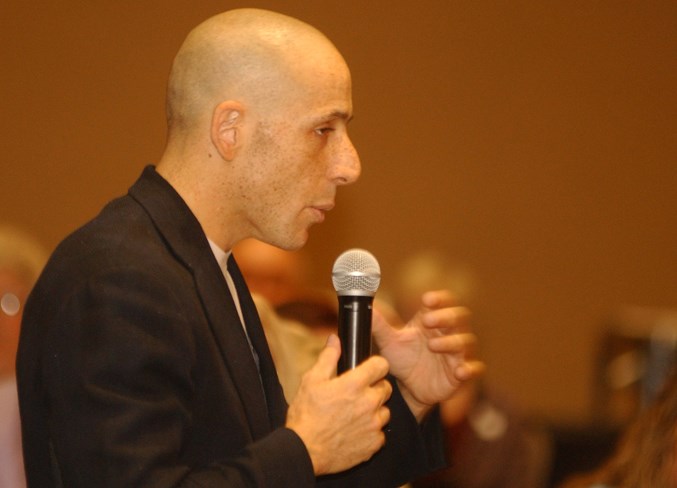"'Are you OK? Is something wrong? Can I help you?'"
Kevin Hines was hoping someone -- anyone -- would ask him that question as he contemplated committing suicide by jumping off San Francisco's Golden Gate Bridge in 2000.
"All I wanted to do was live while my brain was trying to kill me."
In the end, Hines, then 19, did jump, falling 240 feet at about 75 miles an hour in just four seconds.
Miraculously, he survived, one of just a handful of people among more than 2,000 who have attempted to kill themselves that way since the bridge was built in 1937.
Hines told his story during a third annual suicide and depression conference entitled The Conversation Has To Happen...Again, held Sept. 8 in the Pomeroy Inn & Suites.
"I catapulted myself into free fall. There was no cord to be tugged back. I tried to reach back, but it was too late. The millisecond my hands left that rail and my legs cleared it, instant regret for my actions. One hundred and ten per cent recognition I'd just made the greatest mistake of my life and it would be too late," he said.
As a result of that jump, Hines suffered severe spinal and other injuries. He underwent seven-and-a-half hours of surgery that involved mashing parts of his crushed vertebrae into a paste. He also spent two months in the psychiatric ward of a hospital.
"On that day, on that moment, I missed severing my spinal cord by two millimetres," he said, noting he's one of a tiny few Golden Gate Bridge survivors who can stand, walk, and even run.
"I have a 23-staple scar from here to here. I know how many because I pulled them out myself as part of my healing," Hines said.
Hines learned to exercise regularly, eat healthy food and sleep, all of which have helped him feel better.
His message was that no matter how depressed and in emotional pain people may be, there is hope and support for them out there.
But Hines understands what those who are facing depression and/or are contemplating suicide are going through.
"I didn't want to die. I never wanted to take my life. I came to a place of such great mental instability that I believed I had no other option," he said.
"My actions that day were not selfish that day; no suicidal people's are. We're not trying to hurt you, we're trying to stop the pain."
"I know some of you right in this room are in pain. You're going through pain and you're not talking about it. You know who you are," he said, urging those people to stand; many did.
"I want you to look in my eyes. You are beautiful. You are intended to be here. You are worthy of our time, you are no burden and you are absolutely now important to me," Hines said, sparking applause.
During an interview with the Albertan, Hines said it's not over for him. He still suffers from bipolar disorder. Every day he has to fight against the urge to kill himself and he knows it's the same for some who attended Saturday's conference.
"There's no cure. I have every symptom I've ever had regularly. I have chronic thoughts of suicide, but I really fight hard to stay stable," he said.
"I read every new finding on bipolar disorder. The book Bipolar For Dummies is my bible and I'm constantly learning how to better my brain health so I can stay stable."
Hines and his wife Margaret, whom he met during one of his stays in hospital, have set up a foundation and created at least 120 YouTube videos about mental health and how those suffering emotional pain can cope and even thrive.
Hines led the crowd in delivering a message via their cellphones to all those around the world who may be depressed and/or contemplating committing suicide. That message, repeated three times -- louder each time, was "be here tomorrow."
"Ladies and gentlemen, family and friends, be here tomorrow and every single day after that. You are intended to be here, you are worthy and you matter to all of us," Hines said.
Hines received a standing ovation for his speech.



